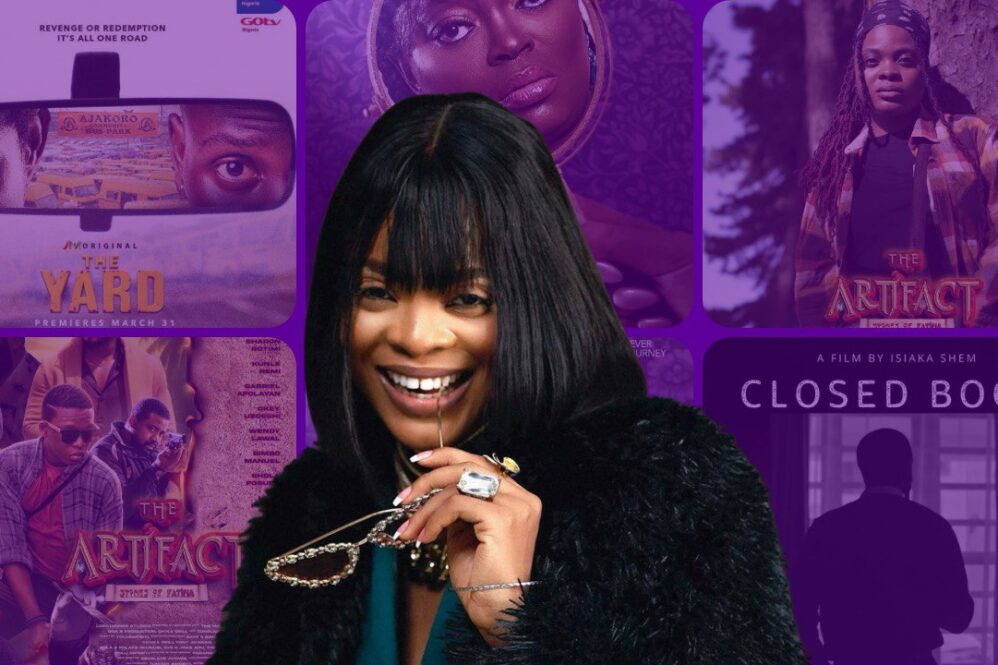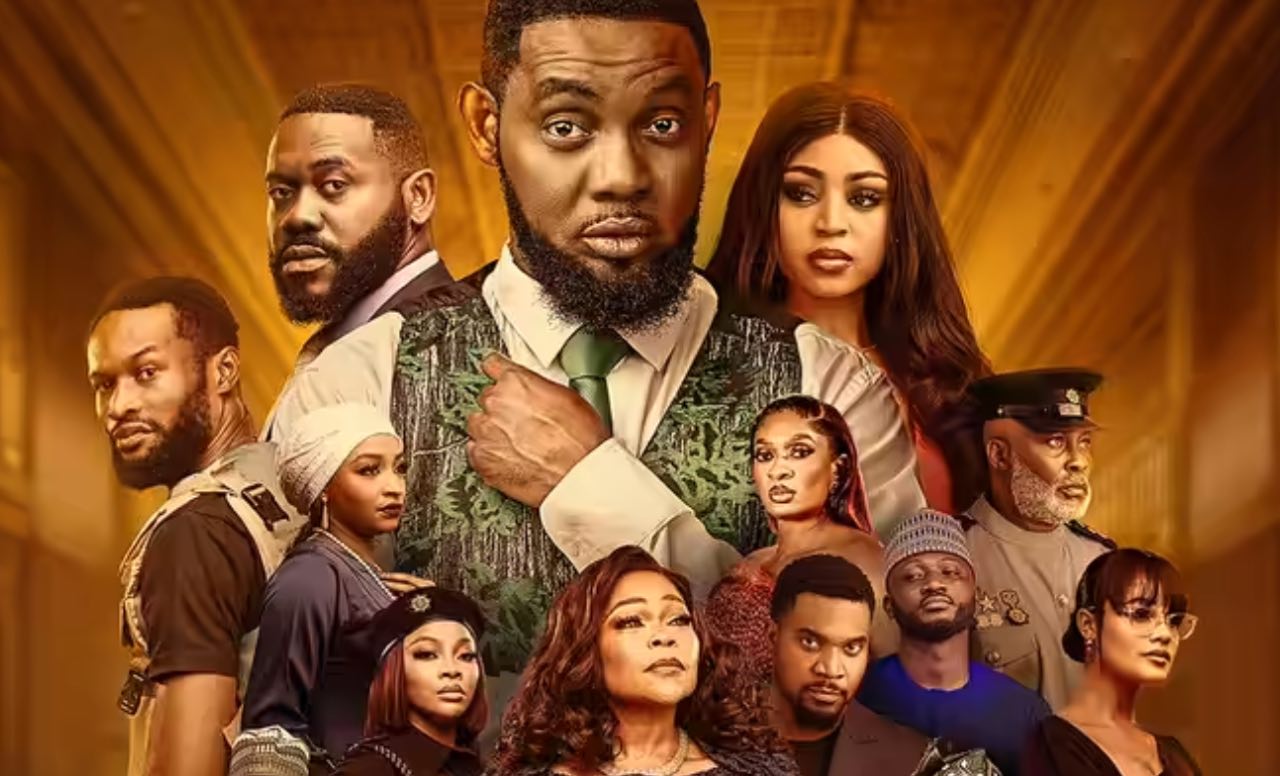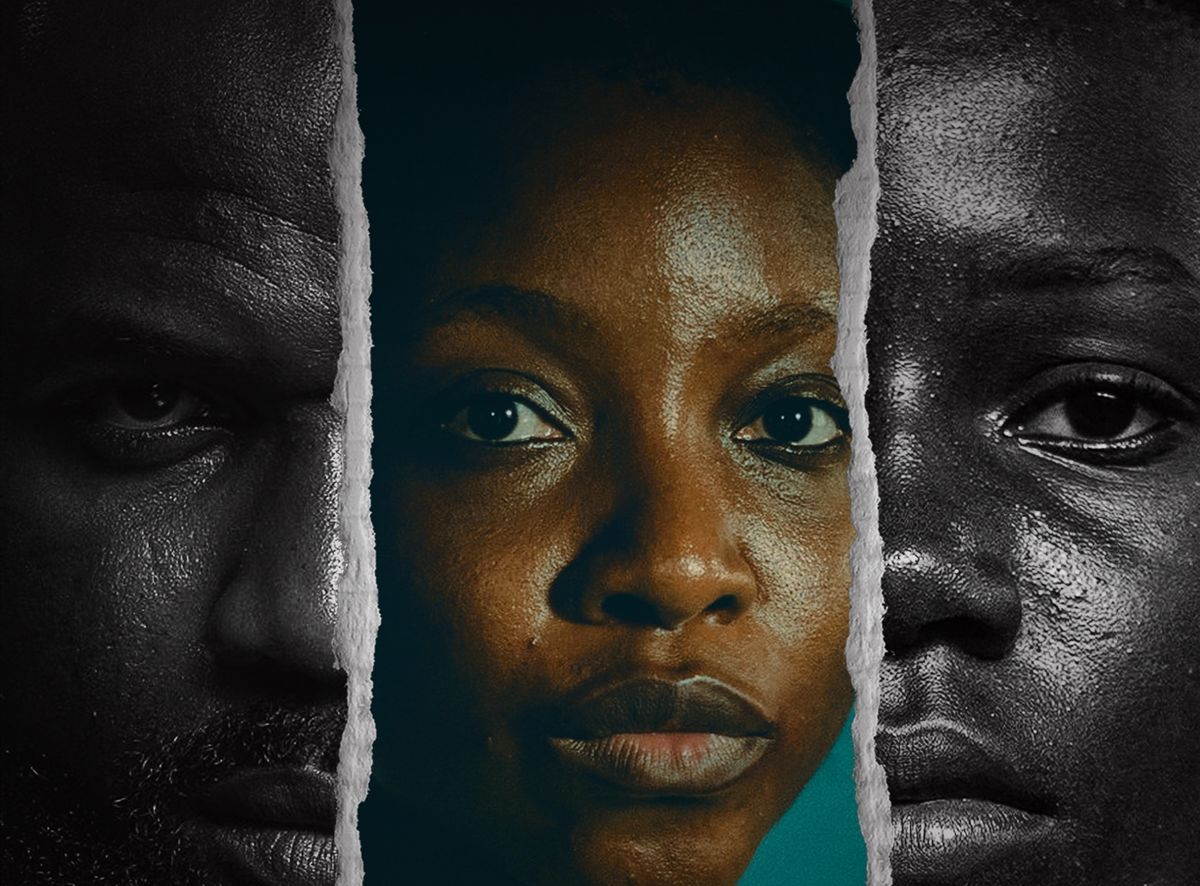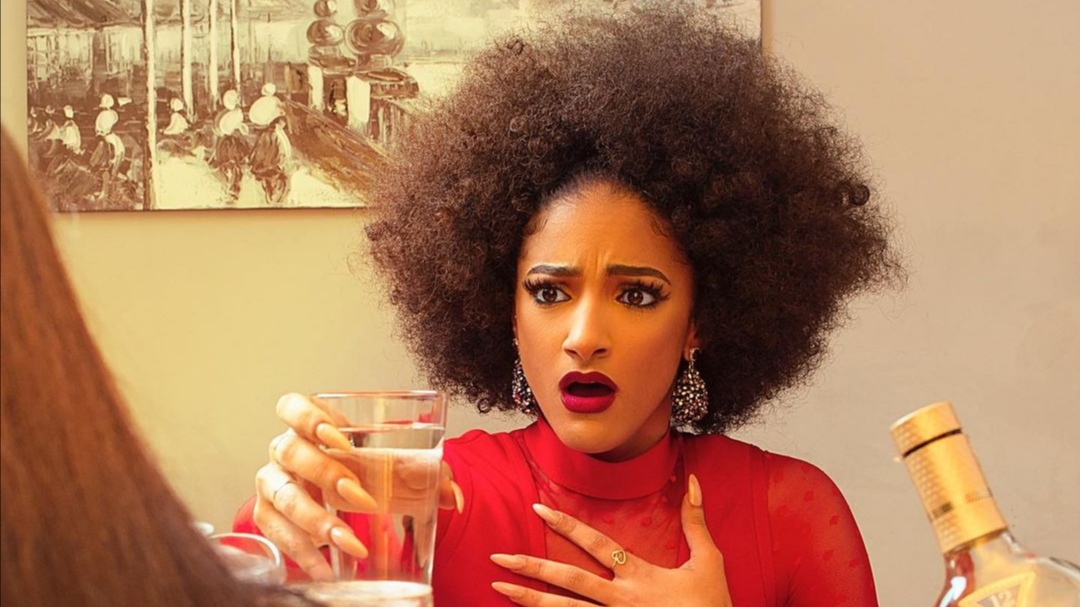Dear reader, help us understand your Nollywood preferences by filling out our audience survey—your input is invaluable and deeply appreciated! Click this link.
Sharon Rotimi and eccentric characters fit like hand in glove. Besides gaining increasing recognition for how intensely she portrays her characters, she’s also known for her daily X (formerly Twitter) empowering mantra, ‘Good things happen to, for, and through me,’ which several others emulate. She’s among the cast of three recent Nollywood projects in conversations in the past weeks.
First is Funke Akindele and Isioma Osaje’s Finding Me, the story of a woman who must reinvent herself while in an emotionally abusive marriage. Sharon plays Ngozi, the middle child in a family of swindlers, acting alongside Omowunmi Dada (Ndidi), Emeka Nwagbaraocha (Ifeanyi) and Tina Mba, who plays their mother.
She also appears in Tolu Lordtanner’s The Artifact. Her role as Chidinma was her first time acting in a feature film — though she’s appeared in other feature films that were released before The Artifact, which was filmed in 2023. In the film, she and three other friends— Jay Jay (Adeoluwa Akintoba), Tunde (Ovy Godwin) and Zara (Miracle Iyanda)—go on an adventure travelling across eight states in Nigeria, seeking three stones hidden in an artifact. Along the way, they must escape other dangerous parties who are also after the stones. This journey takes them to notable landmarks in Nigeria, including Erin-Ijesha waterfall in Osun, Ngwo Caves in Enugu and Assop Falls in Jos.
Her most recent project is Africa Magic’s TV show The Yard, where, according to her, she plays a character that is different from any she’s ever played before. The Yard is a story of two very different men who form an unlikely alliance in a fight for justice.
It’s a busy period for Sharon and while it might seem overwhelming from the outside, in this interview with What Kept Me Up, she says she prayed for times like this.
Three projects you star in have been released and have been in conversations over the past few weeks. How does that feel?
It feels good because I definitely prayed for times like this. Although I’m also not going to deny that it feels a bit overwhelming and there’s the usual imposter syndrome. It’s a combination of lots of things.
What was it like working on a Funke Akindele film set?
It was exciting because everyone knows who Funke Akindele is. When I got called, it so happened that the co-director, Isioma Osaje, texted me to send my audition tape and a monologue to a certain number, which turned out to be one of the producers. I sent in my tape and got the call to play Ngozi. I should mention that I was nervous at first because it’s a Funke Akindele project and everyone knows what this means. However, the moment I entered the room with all the other actors and she started to address us about the story, telling us about each character and breaking down all the things I had read in the script, it painted a whole picture in my head and it was phenomenal. Right then, it all began to make more sense. I was able to witness firsthand all the things that I had heard about Funke Akindele and the creative that she is. She’s just such a brilliant person and an awesome director. On set, she’s everywhere. From makeup to cinematography and costumes, she was just always busy making sure everything was on point as it ought to and that was so great to witness.
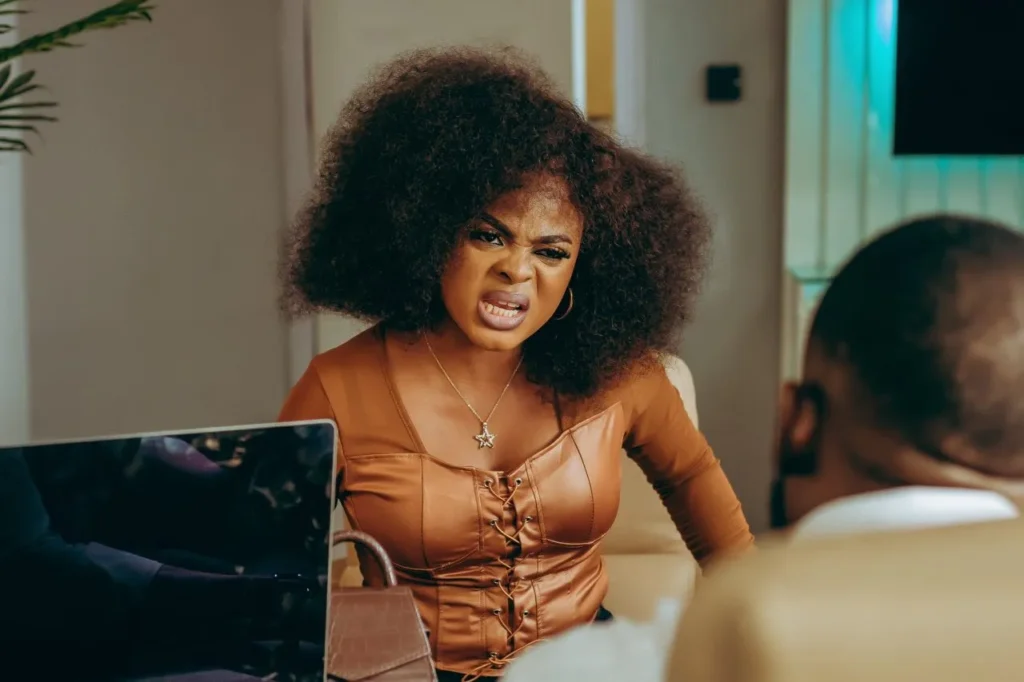
There were two directors on the set of Finding Me. I’ve always been curious about how that typically translates on set, so what was that like?
First, both of them were very much in sync. In moments when Funke Akindele had to be an actor, you find Isioma Osaje stepping up as director. Both kept working hand in hand, and there was no point where it felt like they had very different views or visions of how things were supposed to go. It was a smooth production. For example, in the scene where Ngozi is at the police station, Isioma was on set at the moment and you could tell that it went exactly how Funke Akindele would have wanted it to be, in the way Isioma set the tone for how the scene was supposed to look like and what each person was supposed to do.
Most of all, I appreciate that it shows the collaborative effort between the two of them.
You and Omowunmi Dada play sisters in Finding Me, and you both have good chemistry on screen. How did both of you navigate bringing the characters to life?
Thank you. I’m the first of three children. Though Omowunmi and I are both signed to Guguru now, I met her for the first time on the set of Finding Me and I don’t think she was signed to Guguru yet at the time. On playing Ngozi, I was able to draw inspiration from my family. Just like Ngozi’s family in Finding Me, there are three of us raised by my mother, with my brother being the last born, so it wasn’t too hard to relate to that story. The only difference is that in this story, I’m the second child. Besides drawing inspiration from my personal family dynamics, interacting with Emeka Nwagbaraocha and Omowunmi Dada made it super easy because they were both super cool. Omowunmi being this very lively, bubbly, sweet person on set made working with her easy, which was great because I went from being nervous because I hadn’t exactly worked with these people before, to having a fantastic time on the set. I remember discussing the on-screen sibling dynamic with Emeka and Omowumi before we even filmed, and she gave tips here and there, which also helped when Aunty Funke was giving us directions.
Speaking of your acting journey, your first feature film role was in The Artifact, released right after Finding Me. The film makes the audience feel like a part of the journey. Filming it must have been fun and adventurous, but I’m curious if there was a point where actors started to think – What did I sign up for?
Definitely. I’m not much of a fan of traveling. I like being in new places, but the process is very exhausting, especially when you’re on a hectic shoot with a large team. Regardless, it was just such a great thing to realise that with the leadership of Tolu Lordtanner, it wasn’t as hard as I had expected it to be. Granted, though, I slept throughout when we were moving. I was a bit worried because it was a risk traveling that far even in December, but I think it was worth it.
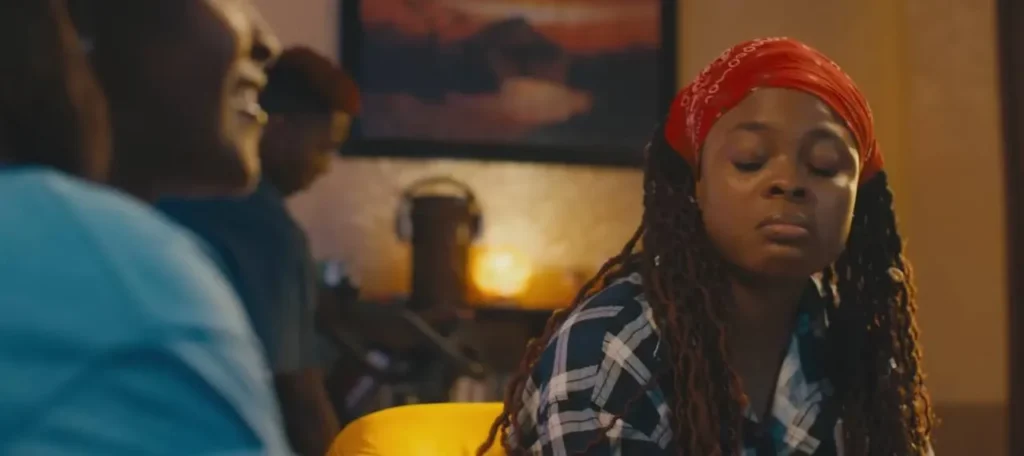
It was your debut feature acting, I’m just curious as to what was on your mind during the production phase, apart from the whole experience.
I was just excited. I remember when I got the call, the producer and director Lord Tanner had called me and said somebody suggested that I would be perfect for a role and he sent the script. I remember picking up the script and not putting it down because of how much I loved the story. I then asked what I needed to do to get on it. I was ready to send a tape or even audition. He invited me for a table reading where I auditioned and got the role. The rest is history, but I was just excited to do something like this. The fact that it is a very ambitious project, I think I consider myself lucky that for my first feature film, it’s something of this scale, although I’m not superstitious, but I do believe that things happen for a reason. I just hope that this somewhat sets the tone for the kind of things I’m considered for, though not entirely, in the future because of the way it pushed me out of my comfort zone.
Would you say some things in your experience as Sharon translated into Chidinma’s experience and reflected in her actions and words?
I didn’t know what to expect when we got to these places, or what I thought I was going to see when we got there. I grew up in the southwest most of my life, and I hadn’t exactly experienced other places at the time except for the one time I went to a cousin’s wedding in Bayelsa because my mom is from there. It was an experience being in these places, seeing these people, seeing culture and it goes without saying that Nigeria is a stunning, beautiful place, beautiful people, sweet, kind, amazing people.
Who was your favourite character and why?
I’m tempted to say Tunde because he is hilarious. The actor who played Tunde is not very much different from the character in his sense of humour. The difference is that Ovy is very intelligent, while Tunde might come off as a bit stupid. We were all laughing throughout the journey. But then I also like Emma because there’s just something about maybe it’s the actor who played her – Wendy Lawal- because I’ve been a fan for a very long time.
I’m curious about something you put up on your X feed about filming emotional scenes and while they are your favourite, they are also your least favourite to film. What did you mean by this and why?
The reason why I feel emotional scenes are my favourite and my worst is first because they allow me to explore. I find that you can do a lot of things with an emotional material. Also, I figure that they are one of my strengths and it’s one of the reasons why people often think of me when they think of serious material or roles. But they’re also my least favourite because of the work they require. Mind you, I like doing the work, but it doesn’t make it very easy. Emotions are not a walk in the park and they consist so many things, especially for complex emotions, where you have to put a lot together to get there. They can also be very exhausting, especially when you’re doing them take after take, in different shots. You’ll need some sort of mental strength to be able to go through the motions like that, and sometimes it takes a bit to snap out of it. I did one yesterday and I was hyperventilating for a few seconds. So they’re really tough.
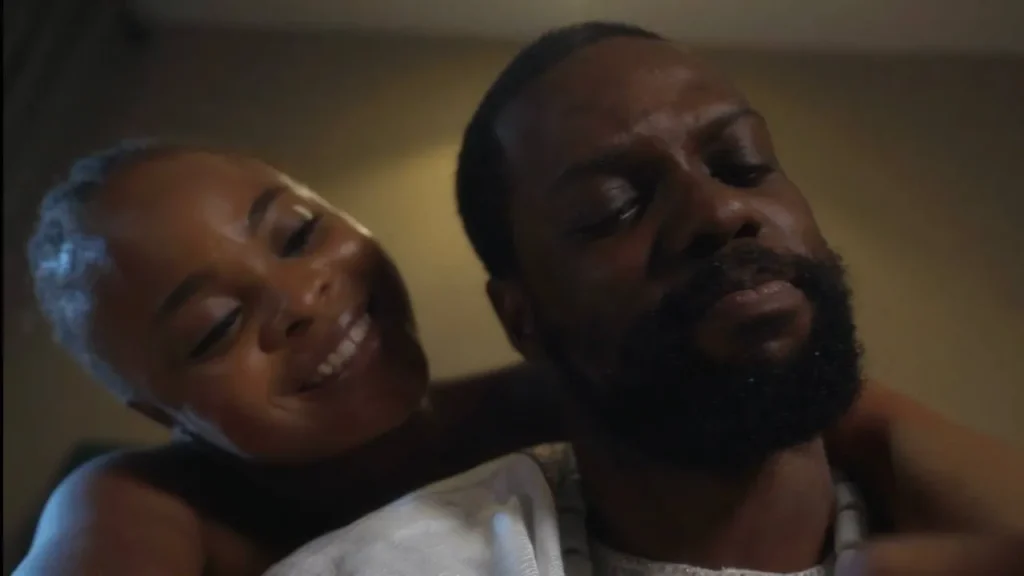
How do you prepare yourself for emotionally heavy scenes?
I don’t know if I would call it a ritual because I haven’t exactly studied what my process is all of that down to a science, but usually, I like to sit with the material and read it over and over again. I also try to stop myself from distractions because everybody’s just great at doing their own thing. Nobody gives a hoot whether or not you’re doing a lot of internal work to get there. I try to avoid noise, and I tend to chew gum multiple times a day, but at that moment, even chewing gum distracts me. Then I try not to draw from personal experiences because it doesn’t always follow. For example, if you are crying over a hurt from a romantic partner and then you’re trying to use a personal experience of an absentee parent, you could cry but they both have very different undertones. Instead, I try to put myself in the character’s shoes. I become that person, when I am no longer Sharon, it’s their experiences that end up feeding me in the moment.
So far, we’ve spoken about the recent feature films you are in, can we talk about your return to TV since Chronicles for a bit? What are you most excited about in The Yard, which is still being filmed?
That will be working with this many talented people. As a creative, you can only pray that not only are you doing these sorts of things, but you’re also doing it with people who are amazing actors, and I tell you that The Yard is filled with a lot of amazing actors whom you can feed off. The story is tight, the cast is amazing, and I can’t wait for everyone to start watching. It’s filled with a lot of ups and downs, and people should just get ready. Get ready to laugh, fall in love, get angry, and cry too because it’s a lot. It’s one project that I’m very excited about. I’m very excited about the character. I’ve been very lucky to be allowed to play a range of characters, but she’s somewhat different from everything that I’ve played before. Especially based on a certain quirk that I have never explored before, which I’m glad to do on this project. Although I don’t know how well I’m doing it, my directors aren’t complaining yet, so I’m enjoying playing this character a lot
How do you hope audiences respond to the show?
The way they are responding right now. I love the fact that The Yard is very relatable. I know in Nollywood, we tend to like flamboyance and opulence. But more than half of the general population cannot exactly relate to that, though we aspire to it and that’s why we like it, but they are not exactly our lived experiences. This is a show for the common man. It is harsh, real and audiences can relate to it because you’ll find romance, pain and a combination of several human experiences. That’s the response that I expect and one that we are seeing.
Become a patron: To support our in-depth and critical coverage—become a Patron today!
Join the conversation: Share your thoughts in the comments section or on our social media accounts.
Track Upcoming Films: Keep track of upcoming films and TV shows on your Google calendar.

